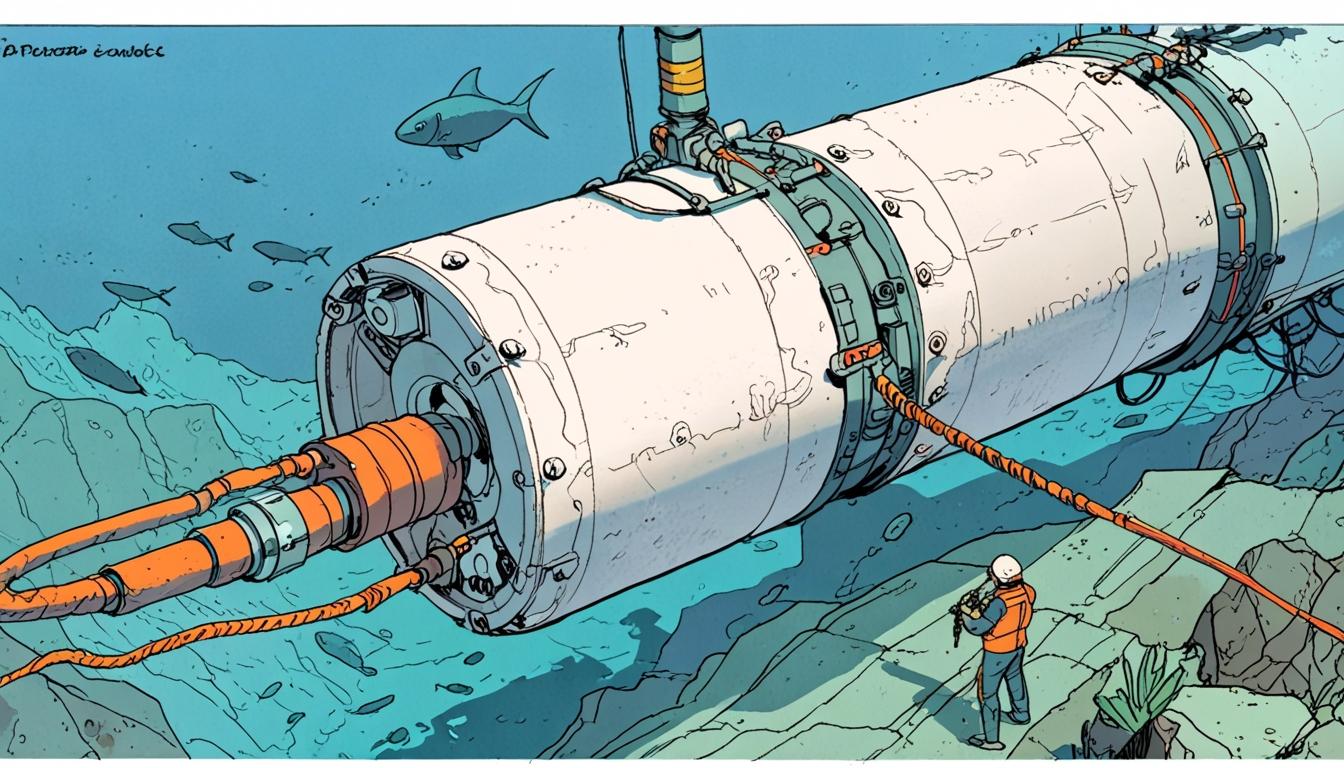Major telecom companies express alarm over increasing attacks on undersea cables, urging global collaboration to protect vital internet infrastructure.
Major telecommunications companies, including Vodafone, Telefonica, and Orange, have issued urgent warnings regarding a surge in attacks on undersea cables, vital conduits for global internet traffic. These cables are responsible for transmitting approximately 95% of international data, making their security critical for maintaining global internet infrastructure and essential services. The concerns were directed to key international entities, including the European Union, the United Kingdom, and NATO, as disruptions to these cables could lead to significant worldwide ramifications.
The accusations surrounding these incidents have prominently featured Russia, which has been directly implicated by telecom companies, although the nation has strongly denied any wrongdoing. The British Defence Secretary has characterised the sabotage incidents as indicative of Russia’s heightened aggression, calling for increased vigilance and the possibility of retaliatory measures. The situation is exacerbated by the fact that there have been 11 documented cases of cable damage in the Baltic Sea alone since October 2023, with similar occurrences noted in the North Sea. This escalating trend has prompted calls for enhanced international collaboration, including intelligence sharing and joint surveillance initiatives, to safeguard the undersea cable infrastructure.
France has taken proactive steps to bolster the security of its undersea cables in light of past incidents, notably the Nord Stream pipeline sabotage in 2022. President Emmanuel Macron initiated a thorough inspection of French cables and has overseen the implementation of enhanced surveillance measures. In partnership with the French Navy and telecommunications operator Orange Marine, the government has introduced security sensors, underwater drones, and advanced maritime surveillance systems to fortify these critical infrastructures. Nevertheless, experts believe that while the threat of total sabotage exists, the odds remain low, as significant disruption would necessitate the simultaneous severing of multiple major cables. France’s data systems are equipped with redundancies designed to reroute traffic in an emergency, ensuring priority for essential services like hospitals and banks over bandwidth-intensive applications.
The broader global implications of targeted attacks on undersea cables cannot be understated. With more than 500 cables facilitating the bulk of international data, any disruption can lead to cascading effects, jeopardising connectivity and security on a global scale. Experts caution that any hostile action against these infrastructures could be interpreted as a declaration of war, highlighting the urgent need for the international community to prioritise their protection. Initiatives may include utilising satellite monitoring systems and bolstering intelligence-sharing frameworks to secure these sensitive areas.
As geopolitical tensions rise, the need for robust international cooperation to preempt potential threats and safeguard global communications has become increasingly apparent. The future of the interconnected world relies heavily on the resilience and security of these undersea cables, necessitating ongoing commitment from nations to adapt to evolving risks. This includes fostering international partnerships, advancing technological solutions, and implementing comprehensive defence strategies to protect vital communication networks in an era marked by digital interdependence.
Source: Noah Wire Services
- https://www.sustainability-times.com/sustainable-business/policy/total-internet-blackout-incoming-russia-accused-of-global-sabotage-attempt-as-the-us-treats-the-threat-with-maximum-urgency/ – This article reports on the urgent warnings issued by major telecommunications companies, including Vodafone, Telefonica, and Orange, regarding a rise in attacks on undersea cables, emphasizing the critical role these cables play in global internet infrastructure.
- https://www.telegraph.co.uk/business/2025/04/10/nato-warned-over-internet-blackouts-in-wake-of-subsea-cable/ – The Telegraph discusses NATO’s concerns about potential global internet blackouts due to suspected Russian attacks on undersea cables, corroborating claims of escalating threats to these vital infrastructures.
- https://datacentremagazine.com/networking/the-consequences-of-severed-subsea-communications-cables – This source outlines the serious global implications of severed undersea cables and the increasing geopolitical tensions that contribute to these vulnerabilities, supporting the need for enhanced protective measures.
- https://www.csis.org/analysis/safeguarding-subsea-cables-protecting-cyber-infrastructure-amid-great-power-competition – The Center for Strategic and International Studies emphasizes the vulnerability of undersea cables to sabotage and the international implications of their protection, aligning with concerns raised about geopolitical tensions and infrastructure security.
- https://jeffnewmanlaw.com/u-s-warns-its-telecom-companies-that-their-undersea-cables-are-highly-vulnerable-to-cutting-and-monitoring-and/ – This article highlights U.S. warnings about the susceptibility of undersea cables to foreign tampering, particularly by China, which connects to broader concerns about the security of these cables amid rising geopolitical threats.
Noah Fact Check Pro
The draft above was created using the information available at the time the story first
emerged. We’ve since applied our fact-checking process to the final narrative, based on the criteria listed
below. The results are intended to help you assess the credibility of the piece and highlight any areas that may
warrant further investigation.
Freshness check
Score:
8
Notes:
The narrative references events starting from October 2023 and mentions recent geopolitical tensions, indicating a relatively recent focus. However, specific timelines for some incidents are not detailed.
Quotes check
Score:
5
Notes:
There are no direct quotes provided in the text, making it difficult to verify their origin or accuracy. This lack of direct quotes necessitates a moderate score.
Source reliability
Score:
4
Notes:
The narrative does not explicitly mention the origin or credibility of the information. It references major international entities but does not align with known sources like the BBC or Reuters, which could provide higher reliability.
Plausability check
Score:
7
Notes:
The claims about undersea cable attacks and international responses are plausible given current geopolitical tensions. However, specific details about sabotage incidents and reactions from nations like Russia lack concrete evidence in the provided text.
Overall assessment
Verdict (FAIL, OPEN, PASS): OPEN
Confidence (LOW, MEDIUM, HIGH): MEDIUM
Summary:
The narrative seems plausible in the context of current geopolitical tensions, but lacks concrete evidence for specific events and quotes. The freshness is relatively good due to recent references, but source reliability cannot be fully confirmed due to a lack of specific origin. Thus, while the narrative is not inherently implausible, it requires further verification.













